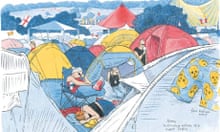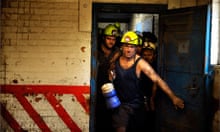"Julian and Maddalo" by Percy Bysshe Shelley
For non-swimmer Shelley, the beach was for galloping on his horse with Lord Byron. In this poem, he delights in the "bare strand" which "breaks the flow / Of Adria towards Venice". "I love all waste / And solitary places; where we taste / The pleasure of believing what we see / Is boundless, as we wish our souls to be". The once deserted strand is now known as the Venice Lido.
"Dover Beach" by Matthew Arnold
The most famous English beach poem takes "the grating roar / Of pebbles which the waves draw back, and fling, / At their return, up the high strand" as a metaphor for the godless hydraulics of the world. The poet imagines Sophocles hearing the same sound on some Aegean beach and thinking of "the turbid ebb and flow / Of human misery".
"The Beach of Falesá" by Robert Louis Stevenson
British adventurer John Wiltshire opens a trading post on a South Sea island. He falls in love with Uma, a native girl, and finds himself in rivalry with another trader, Case, who has a strange power over the local inhabitants. The beautiful beach – the perfect spot – will be the place for a violent showdown.
"The Idea of Order at Key West" by Wallace Stevens
The poet walks on the beach where he spent his holidays and hears a woman singing. "She sang beyond the genius of the sea. / The water never formed to mind or voice, / Like a body wholly body, fluttering / Its empty sleeves". The song makes the world seem ordered and beautiful.
"The Terminal Beach" by JG Ballard
In Ballard's short story, Traven visits a beautiful Pacific island that was once the scene of a nuclear test. The hull of his small boat ripped by coral, he is marooned in this heavenly/hellish place, where the white sand is peppered with abandoned towers and blockhouses. Tormented by the recent loss of his wife and child, he begins to go mad.
"The End of March" by Elizabeth Bishop
Bishop's winter beach is huge and empty. "Everything was withdrawn as far as possible, / indrawn: the tide far out, the ocean shrunken, / seabirds in ones or twos". All that is ordinary is transformed and the cold light makes it a visionary place. "The sun came out for just a minute. / For just a minute, set in their bezels of sand, / the drab, damp, scattered stones / were multi-colored".
The Wasp Factory by Iain Banks
The deserted Scottish beach near his isolated home is where 16-year-old Frank Cauldhame plays elaborate fantasy games, performing pseudo-religious rituals and conducting cruel experiments on animals. His scientist father has chosen to live at the edge of the land for sinister reasons, and here you learn just how nasty nature can be.
Brazzaville Beach by William Boyd
Washed up like driftwood, Hope Clearwater lives in a beach house on Brazzaville Beach. She sits there and recalls her past – her broken marriage, her disturbing experiences researching animal behaviour, her involvement in a civil war – as the waves roll in. The beach is where you go to get your head clear.
The Beach by Alex Garland
Richard goes to Thailand in search of a remote and perfect beach populated by an assortment of druggy fellow backpackers. If this sounds like hell, you know more than Garland's protagonist, who seems genuinely surprised when things turn very nasty indeed.
On Chesil Beach by Ian McEwan
The Dorset beach is where Edward and Florence find themselves on the first night of their honeymoon, angrily venting their worst feelings after their first, disastrous attempt at sex. Chosen as a beautiful retreat for lovers, it is a stony place by moonlight – a bare stage for the couple's painful drama.








Comments (…)
Sign in or create your Guardian account to join the discussion